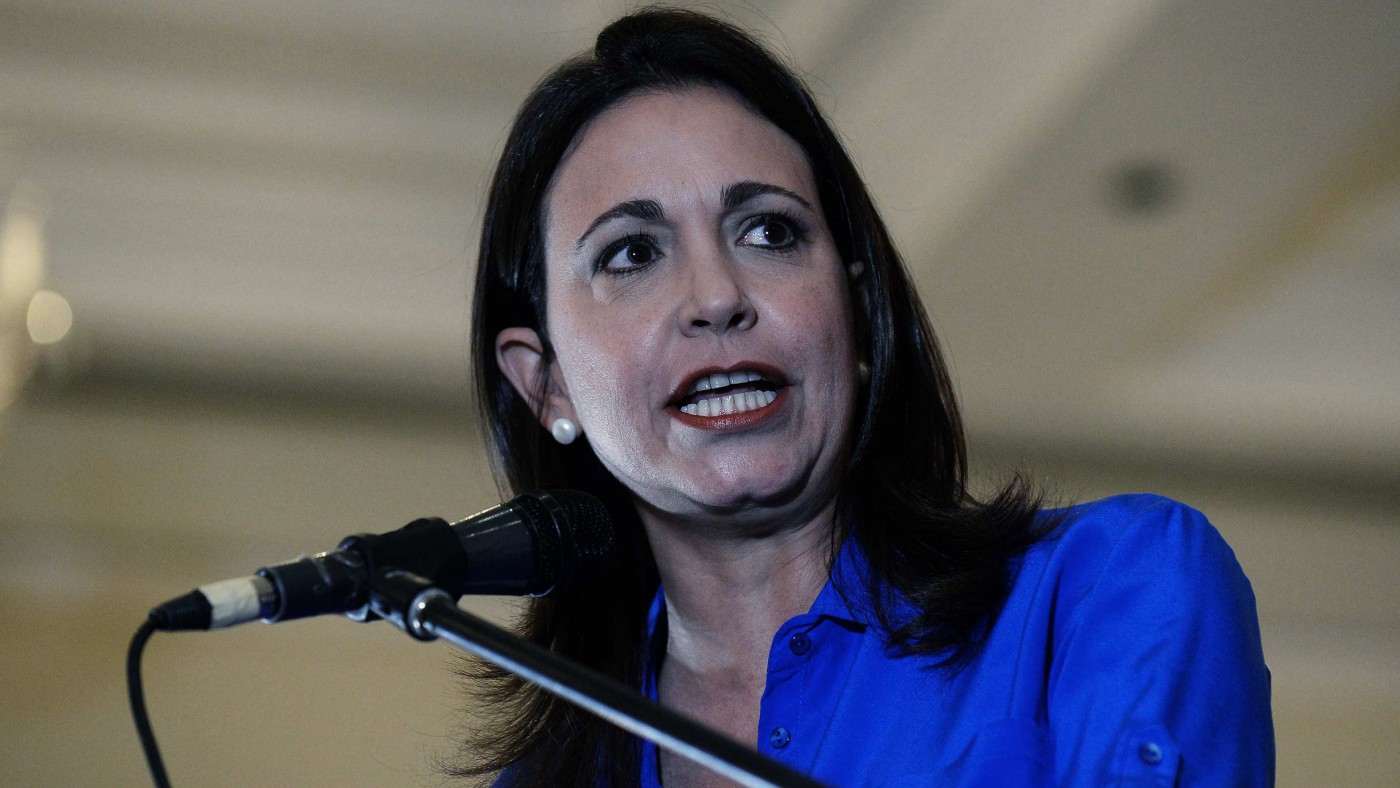Last week, Venezuela’s Comptroller General issued a decree barring Venezuela’s leading female politician, Congresswoman Maria Corina Machado, from public office. The “mistake” for which Machado was punished was an alleged technical flaw in her mandatory financial statements. Machado has vowed to fight the move.
This isn’t the first serious obstacle Machado has faced in Venezuelan politics. She’s used to taking punches as part of her job — literally. Two years ago, a pro-government legislator broke her nose in the floor of the legislature. The assault went unpunished.
After meeting then-President George W. Bush in the Oval Office — the only member of Venezuela’s opposition ever to have such an audience — Machado was charged with treason. (She was subsequently pardoned.) More recently, she has been charged with attempting to kill President Nicolás Maduro, and a judge has barred her from leaving the country.
Her emails have been hacked and, according to independent experts, altered. Her phones are tapped, and her private conversations are frequently aired on state-run TV. Her family is constantly hounded, and mobs of government activists attack her public appearances. After being elected with the most votes of any of her colleagues, she was unceremoniously kicked out of parliament. It is fair to say that the government is obsessed with Machado.
As the latest legal process against her continues — inasmuch as it can, given how the rule of law has been practically banished in Venezuela — a question lingers: why does the ruling elite loathe Machado so much? Why is she so consistently in the government’s crosshairs?
Part of it, of course, has to do with her gender. In a country where machismo still rules, Machado is a lightning rod because she is brash and outspoken. She is an engineer, a relatively rare thing in a country with the world’s highest quota of beauty queens. As such, she is used to standing out in male environments.
For example, Machado once confronted Hugo Chávez on his policy of expropriating private companies without compensation, calling it “theft.” Few politicians ever dared show such bravado — much less female ones.
Another part of this obsession has to do with her background. Machado is a scion of several of Venezuela’s wealthiest families. Her multi-lingual, elegant public persona stands in stark contrast with the militaristic vulgarity that permeates the higher echelons of the Venezuelan government.
Yet a large part of it has to do with the fact that Machado is an unequivocal defender of free markets. A couple of weeks ago, I met Machado in her Caracas office to discuss her economic philosophy. In a country where few politicians dare to talk about free markets, Machado is an unabashed defender of them.
The Venezuelan state, according to Machado, has to downsize — both in terms of GDP and in terms of the number of people it employs. “The state,” she told me, “oppresses Venezuelans. It needs to be a provider of public goods, and it needs to stop interfering with Venezuelans’ desire to live freely.” In a country where the state monopoly in the oil industry is taken by many as a dogma, she defends private participation in the industry.
Machado’s defense of markets would seem to run counter to the mainstream of Venezuelan public discourse. Undeterred, she points to a recent Pew Research Center survey showing that 67 percent of Venezuelans support free markets. “This is the highest percentage of all Latin American countries surveyed, higher even than that found in the UK or France.”
Machado’s clear stance on markets stands in sharp contrast to most of her colleagues in the opposition. For example, the jailed Leopoldo López has always defined himself as a “progressive” member of the center left.
The same is true for former presidential candidate Henrique Capriles. A few days ago, Capriles presented a set of “urgent” economic measures that called for across-the-board salary increases of 50 percent as well as new subsidies for struggling families. Both measures would cause the fiscal deficit — already estimated at 20 percent of GDP — to shoot up. He did not mention lifting the country’s oppressive price and exchange controls. Several opposition economists expressed their disappointment with his proposals.
On this topic, Machado is clear: controls must be lifted as soon as possible while implementing measures to protect vulnerable families during the transition. She also believes the price of gasoline — the lowest in the world — has to be raised, although she would oppose the move if it were implemented by this government. Machado claims it would be immoral for the current government to raise the price of gas when it gives away tens of thousands of barrels of oil per day to Cuba for free, a policy everyone in the opposition rejects.
Machado’s determination frequently gets her into trouble, but she says it’s only a reflection of what she sees from Venezuelans from all walks of life. Even members of the armed forces, a supposedly monolithic body that Hugo Chávez courted heavily, one that everyone assumes backs the government completely, are fed up. They suffer from scarcity and crime just like the rest of Venezuelans, and they resent how the current government has infiltrated and politicized the corps.
“I was at a religious procession the other day, and as I was leaving, a young army sergeant came up to me,” she told me. “He said, ‘Swear to me that you’ll never give up.’”
“This government has tried to destroy the armed forces in the same way it has tried to destroy the country,” she said. “People are finally convinced of this, and they are waking up. The international community has also come to the realization that this government is simply not viable. The transition out of this mess has already begun.”
This article was originally published by Democracy Lab, and can be found here.


